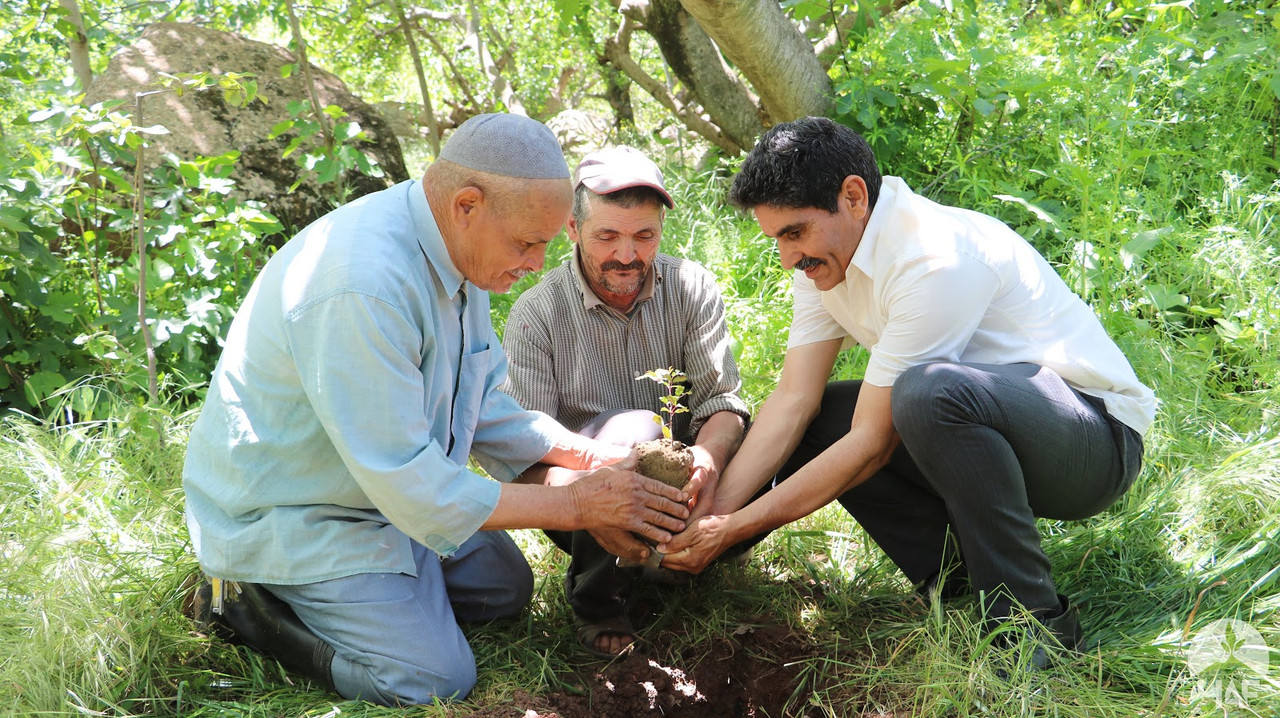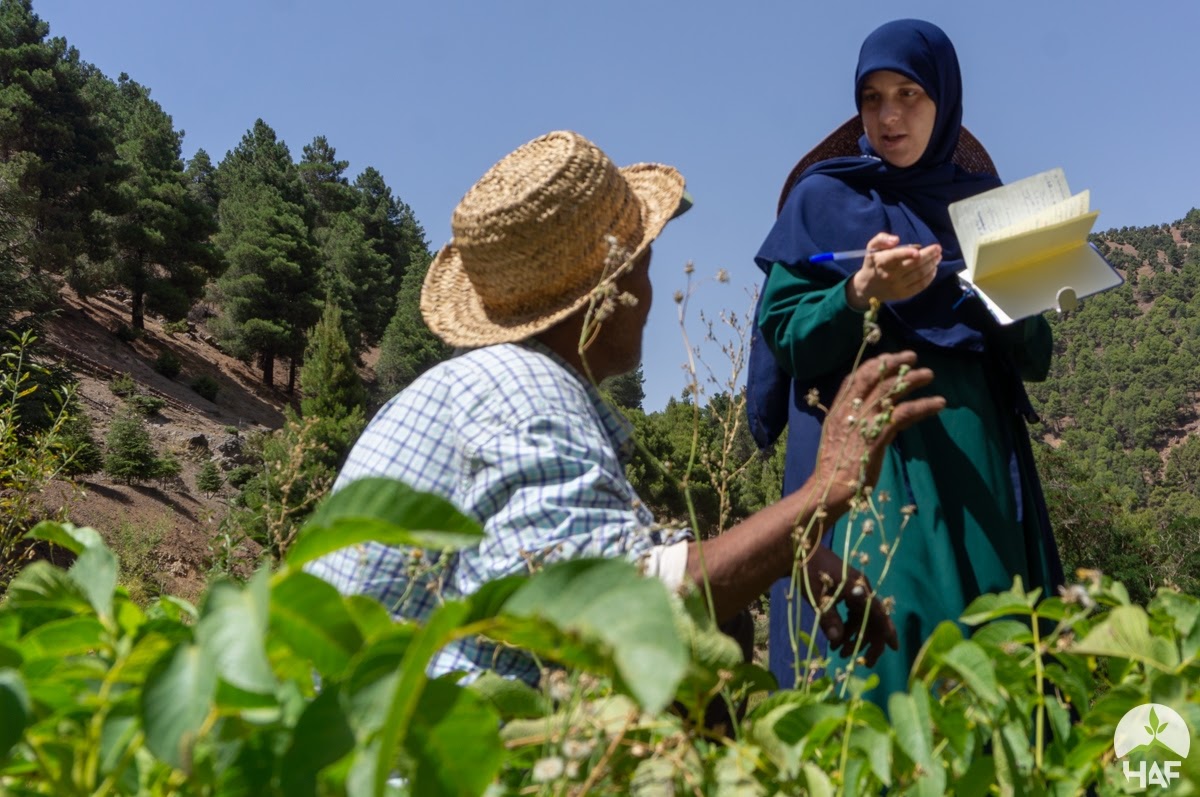1.Fruit tree planting

The High Atlas Foundation (HAF) with its community, government, and civil partners currently manages 11 organic fruit tree nurseries in 7 provinces of Morocco, all on land lent in-kind. These partners include: The High Commission of Waters and Forests, the Ministry of Youth and Sports, the Moroccan public-school system, the Moroccan Jewish community, cooperatives and associations across the country, and various universities and provincial authorities.
The total capacity of HAF’s nurseries is 2.44 million seeds through 2021, primarily funded by Ecosia, the German social enterprise. The sapling varieties grown at HAF’s nurseries include almond, argan, carob, cherry, fig, lemon, pomegranate, and walnut. The aromatic and medicinal plants grown are capers, cumin, fennel, geranium, lavender, marjoram, oregano, peppermint, rosemary, sage, tarragon, thyme, and verbena.
HAF’s production of fruit trees for Moroccan families, schools, and communities not only benefits their livelihoods and environments but also helps to build highly productive partnerships between the people, their government, and various intercultural groups.
HAF’s organic fruit tree nurseries are of critical importance to farming families as they make the daunting transition from the traditional staples of barley and corn – which cover 70% of agricultural land, but only produce 15% of agricultural income – to the cultivation of fruit tree varieties.
-
USAID Farmer-to-Farmer Program

In July 2019, HAF launched the 45-month program Farmer-to-Farmer with the United States agency of International Development, bringing 70 agricultural experts from the United States to assist in capacity-building with 80 cooperatives in the regions of Marrakech-Safi, Beni Mellal-Khenifra, and Oujda. These volunteers bring expertise to all phases of the agricultural development value chain, including tree and plant nurseries, irrigation, cooperative-building, food safety, and commercialization of processed product. HAF is committed to this entire agricultural chain and works diligently with Moroccan and international partners in all of these areas. Upcoming assignments directly related to the HAF-USAID partnership involve experts in nursery design and expansion, irrigation and water infrastructure assessment, agro-forestry techniques and skills transfer, organic certification, developing business plans related to carob, fig, pomegranate, and processing of other product, the monitoring of tree growth, and cultivation of wild medicinal plants.
Apply now to be Farmer-to-Farmer volunteer:
1) for prospective U.S. F2F Volunteers
2) for prospective Moroccan F2F Volunteers
-
Agricultural Development and Monitoring

Two of HAF’s eleven nurseries are located at Centers for the Protection of Children, where detained teenage boys receive technical training in organic fruit tree agriculture. This program, along with tree planting projects at hundreds of public schools across the country, raises the environmental consciousness of citizens of all ages and promotes the benefits of organic agriculture, volunteerism, and public service.
The Moroccan government’s contribution of land to local communities forges a mutually satisfying partnership and builds confidence between the people and the state. An additional two of HAF’s nurseries, on Jewish community lands at Akrich and Ouarzazate, serve as multicultural and interfaith projects underscoring Moroccan bonds of social solidarity.
The planting season in Morocco begins in mid-December and concludes in mid-March, during which the High Atlas Foundation transplants, with the aid of beneficiaries, tree saplings to 23 provinces and reseeds nurseries to their maximum capacities shortly thereafter.
Importantly, the High Atlas Foundation has ten active contracts of in-kind land for which we do not currently have funding to implement planting initiatives. These ten nurseries would have the facility to grow 50 million trees annually if brought to scale!
All HAF nurseries are irrigated with pressure drip systems and solar pumps. Approximately half of HAF nurseries are within greenhouses and are equipped with shaded areas where small saplings are placed to free up greenhouse space for continual reseeding.
Each nursery has a primary caretaker from the local community, who HAF supports by way of technical training and employment. HAF is devoted to building the skills of these caretakers to also be facilitators of community dialogue and monitors of tree planting areas for data gathering, including specific GPS points, height, and diameter of trees. This data is crucial in internationally certifying, accrediting, and commercializing carbon offset credits for reinvestment back into the communities they came from.
The High Atlas Foundation’s rigorous monitoring system helps to ensure the continued health of trees and to evaluate our implementation strategies, allowing us to achieve enhanced tree survival rates and sustainability.
Resources
- كتالوج زراعة الأشجار
- HAF Carbon Brochure 2023
- HAF Carbon Brochure 2023 (French Version)
- THE CASE TO PLANT 10 MILLION TREES ANNUALLY IN MOROCCO
- TREE PLANTING AND CARBON OFFSET PRESENTATION
- HAF IS RECRUITING RPCVS TO SERVE AS VOLUNTEER CONSULTANTS THROUGH THE FARMER-TO-FARMER PROGRAM
- PLANTING TREES WITH THE HIGH ATLAS FOUNDATION
- MOROCCAN AGRICULTURE AND RURAL DEVELOPMENT
- ORGANIC AGRICULTURE: CAN THE MEEK INHERIT THE EARTH?


